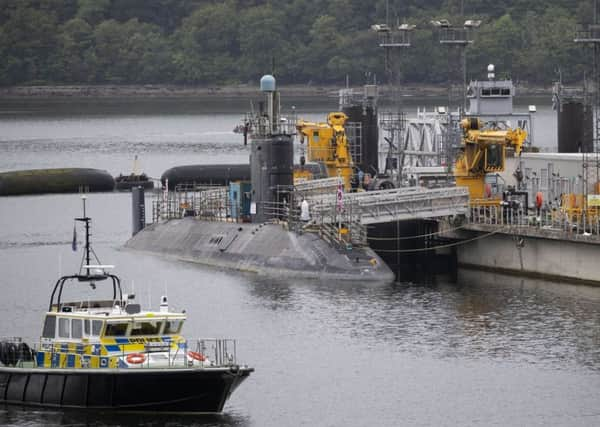Artificial intelligence and ‘big data’ vital to UK’s nuclear deterrent – Rear Admiral John Weale


HM Naval Base Clyde will become the home to all of the UK’s submarines by 2020, meaning that we must have the right people with the right innovation skills, in the right place at the right time.
I have been a submariner for 32 years and sadly, the time has come for me to move on from the post of Rear Admiral.
Advertisement
Hide AdAdvertisement
Hide AdThe Faslane base on which I serve is a small site, constrained by sea to the west and road and rail on the east. However, with 11 submarines and 8,500 people with their families, we have an abundance of ambition.
This year has been a year of delivery, with the arrival of two new submarines and the development of a new submarine escape school. An increase in personnel means we are building accommodation blocks that will likely be on a par with the number on any large UK university campus.
Here I have two key jobs; the first is to perform my duties as Flag Officer for Scotland and Northern Ireland and the second is to serve as Head of the Royal Navy submarine force.
The overall objective of both has been to maintain the status of the submarine service as a world-leading fighting force, in part by exploiting new technologies.
Outside help not an option
Our Vanguard class submarines have been an essential part of the Continuous At Sea Deterrent that has been in place for 50 years and is more technologically complex than any space shuttle.
These impressive Vanguard vessels can carry a nuclear weapon in a canister, surrounded by high-pressure systems. We then place Royal Navy personnel in these submarines and ask them to live in it, often for months at a time.
To live in such an environment, where outside help is not an option, all our personnel must harbour first-class technical skills and crucially, possess an ability to problem solve.
If our branch of the armed forces is to be at the forefront of emerging technologies, then we must work collaboratively with a myriad of organisations. This transformation is about engaging more broadly with the wider science, technology, engineering and maths (STEM) community to gain a competitive advantage. Any tech start-up will advise you to do that.
Society being shaped by technology
Advertisement
Hide AdAdvertisement
Hide AdThat is why we are delighted support Glasgow Science Centre forthcoming innovation exhibition, Idea No59. When Idea No59 opens in March 2020, I am confident it will encourage everyone to consider how society is being shaped by technology and innovation and inspire the next generation of problem-solvers and creative thinkers.
Artificial intelligence and ‘big data’ are two emerging trends that I am pleased the exhibition will explore. Warships can suck in huge amounts of data and evidently it takes time to work out equations with pen and paper. A computer completes this process much more quickly and we want the most efficient decision-making process for our submarines and crew to deliver its task.
We are getting good at data management, but we are still on a journey. So much of what we do is automated, including the use of drones to improve maintenance, but that in itself brings complexities.
For decades, physics and maths has been helping us to understand the oceans and advanced computer systems. Now we need people with a good grasp of big-data management and artificial intelligence.
The characteristics associated with innovators are precisely what we are looking for in Royal Navy personnel. When you are at sea, you can’t give up. The ocean is not your friend.
The Royal Navy must remain relevant with STEM and its skills to allow us to train and educate a workforce to achieve their ambitions and our aims. I have every confidence that we will continue to rise to these challenges.